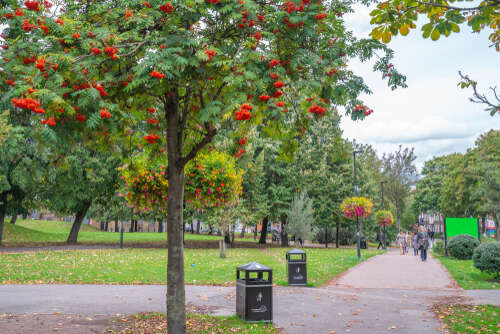
In the 17th and 18th centuries in particular, many of the functions of a modern park were fulfilled by “pleasure gardens”: sort of early modern theme parks that promised the finest recreations and entertainments. Very few of these have survived in anything approximating their original form – although sometimes portions survive as small city parks and associated public houses linger, if only in name.

The big pleasure garden, probably the most famous and widely imitated, was Vauxhall Pleasure Gardens. Originally opened in 1660 as the New Spring Garden, basically just a nice bit of garden to walk around in, it initially generated cash by selling refreshments. Early writer Samuel Pepys was apparently fond of the lobster.
Over the years, its business model evolved. By the 1700s, it was charging for entrance and was making its name as a music venue, the proprietors having constructed a concert hall (with its own organ). People of all classes flocked to Vauxhall – “even Bishops (we are assured) have been seen in this Recess without injuring their Character”, records a contemporary guidebook.
As they hadn’t built Vauxhall Bridge yet, visitors’ first experience would typically involve arriving in a boat to find “a crowd of people bawling, and swearing, and quarrelling”, which you had to fight your way through to hand over a shilling and enter the gardens. At night these were lit by thousands of lamps, which was itself enough excitement for most people back.
After walking about for a bit you’d head to the concert, then at half-time spend 4p on a quart of beer or eight shillings on a bottle of champagne. The food was legendary, but not necessarily for the right reasons. Chickens were apparently “sparrow-sized” and slices of meat were reputed to be so thin you could read a newspaper through them. One legend stated that the carver earned his job after covering the entire gardens in slices of a single ham.
With competition hotting up – Royal Surrey Gardens and Cuper’s Gardens within walking distance, and Ranelagh and Cremorne Gardens over the river in Chelsea – the range of attractions increased. Fireworks had become one of the era’s most popular attractions, so a 60ft-high tower was constructed for the purposes of important firework deployment.
In 1827 the park restaged the Battle of Waterloo with 1,000 combatants. The “battleground” was subsequently reconfigured into the ‘North Pole’, and then ‘Venice’. One flyer promises an ‘extraordinary novelty’: a Mr Green will ascend in a balloon while riding a horse.
Vauxhall Gardens
The gardens even got royal approval. As a prince, King George IV had been a big fan, so when he finally got the big chair, they became The Royal Gardens, Vauxhall. It was famous enough that some imitators really didn’t bother to disguise what they were doing. Copenhagen’s Tivoli, the world’s second oldest theme park, started life as the Tivoli & Vauxhall pleasure garden (the owner’s pitch to Denmark’s king: “When the people are amusing themselves, they do not think about politics”). There was also a Vauxhall Gardens in Birmingham, though it’s unclear whether it made up for being in Birmingham.
As times moved on, the original struggled to maintain a profit, and in a prescient turn it even started generating noise complaints from the neighbours who had all definitely lived there since 1660. It was flogged off, and after one final firework display in 1859, building developers moved in and obliterated it.
After slum clearances, a small park was developed on part of the original site, behind the railway lines at Vauxhall. It was given the name Spring Gardens, the original name of the Pleasure Gardens, but clearly in 2012 someone at the council thought “forget it” and cut to the chase, so Vauxhall Pleasure Gardens lives again in name. In the 1990s you could even go up in a balloon to see what London looks like from the air (because they hadn’t invented the London Eye yet).
Extant ‘entertainments’ include a small city farm (home to some unlikely alpacas, shoved in with the sheep) and a theatre that went viral for three minutes after insulting potential applications in a job advert. And in a way, isn’t “viral content” the “pleasure garden” of the 21st century? Really makes u think.
[Read more: What was the best park in London to hold a duel?]






